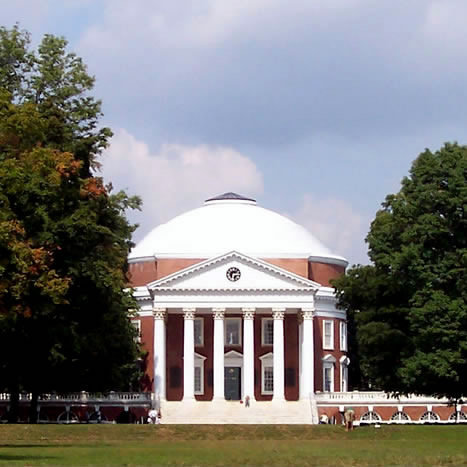Lessons *Not* Learned by the University of Virginia

The Rotunda at the University of Virginia. Credit: Wikipedia
I have bonds of affection -- and immense gratitude -- for my education at the University of Virginia. Inspired faculty members prepared me for a lifetime of teaching as well as writing American history. William H. Harbaugh, Maurice J. Meisner, Merrill D. Peterson, and Willie Lee Rose instantly come to mind. It was there that I taught my very first classes -- US Survey I -- as a lowly teaching assistant. I also formed friendships among my fellow graduate students that endure to this very day.
Reflecting back over forty-eight years since I first set foot on the grounds, I recall my good fortune frequently and fondly. The University of Virginia fortified me for what evolved into a rewarding career teaching and writing American history at the City University of New York, at Lake Forest College, and as a visiting professor at the University of Chicago.
Equally important to the these experiences, eventually I found myself with opportunities to serve on numerous search committees, external evaluation committees, as well as several governing boards in the not-for-profit sector. Within the department of history at Lake Forest College I participated in -- and occasionally chaired -- searches for professors. The college administration also drafted me to serve on searches beyond my immediate realm (e.g., in biology, chemistry, and economics). I also sat on two search committee seeking candidates for the position of dean of the faculty and another for a library director. As a trustee of the Chicago History Museum I have sat on three presidential search committees. In the realm of public service, I served as a library trustee and as chair of two different municipal regulatory boards.
From these cumulative experiences I have learned -- and continue to learn -- about the processes and protocols which stand at the very core of governance issues which are fundamental to the well being of institutions of higher education. The University of Virginia's Rectors and Board of Visitors, it abundantly clear, did not learn its lessons about the responsibilities which stand fundamental to the governance of complex institutions.
A case in point dates back to the upheavals on college and university campuses late in the 1960s. I think foremost of Princeton University. Beset by sustained protests, President Robert F. Goheen adroitly responded by forming a committee on university self-governance that encompassed trustees, administrators, faculty, and students. They collaborated as equal partners. This masterful strategy defused the forces, on the left and right, which had roiled that campus. Simultaneously the administrations at Columbia University and Stanford University found themselves utterly incapable -- explained by inept leadership -- to respond to comparable challenges. In each instance the university president, having lost the support of campus constituencies, soon departed from office involuntarily.
What has occurred at the University of Virginia since June 10 -- the Sunday morning when President Teresa Sullivan precipitously found herself ousted -- reminds me of the fragility of our colleges and universities when significant process and protocols go awry. It saddens me -- indeed, I am appalled -- by the ineptitude of the Board of Visitors and its Rector. For all of the expressions of their devotion and loyalty to advancing our great university, they have forfeited the responsibilities bestowed upon them by the Commonwealth of Virginia.
EPILOGUE: Just as this was written the Board of Visitors announced that it will reconsider President Sullivan's status at a meeting scheduled for June 26.
